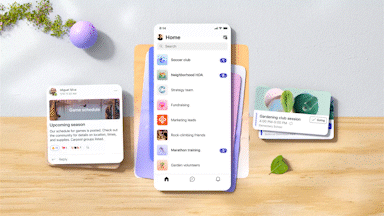It’s not clear how many consumers actually prefer to use Microsoft Teams outside of work, but that hasn’t stopped Microsoft from trying: The free, consumer version of Teams now has a “Communities” feature to connect online.
Microsoft is adding the feature to just the Android and iOS versions of the free Teams app that it launched last year. A desktop version will come soon, Microsoft says. Communities adds the ability to join your friends to a group, with shared messaging, calendaring, and group calls.
But the issue that Microsoft hasn’t really seemed to overcome is this: Microsoft seems to want consumers to organically sign on to Teams and plan their next night out, but it simply can’t avoid leaning on its legacy of business applications. The American Youth Soccer Organization (AYSO) will use Teams to connect its 500,000-member community group, set practice schedules, and the like. USA Hockey plans to do something similar to build communities among grass-roots hockey teams.
The point is that AYSO and USA Hockey communities aren’t being built from the ground up; the organizations will simply tell their members that Teams will be the way the organization will communicate. That’s not much different than your employer dictating which web service will be used for communication, collaboration, and workflows.

Microsoft
And Teams new Communities looks like Teams: While you’ll be able to administer and moderate groups, sharing messages and documents and organizing events, the UI still looks very similar. “Personalization” appears to be limited to “branding elements” (Microsoft’s words) like a group picture. You’ll be able to access Communities via the Home tab on the mobile app, though you may need to switch out of your work account to do so.
It all feels very different than how freewheeling, organic communities form on Discord, Snapchat, or other messaging services. If you’re the type of person who already has all of your holiday shopping done, Teams Communities may be for you. If you prefer something a bit more chill, Teams Communities probably isn’t.




